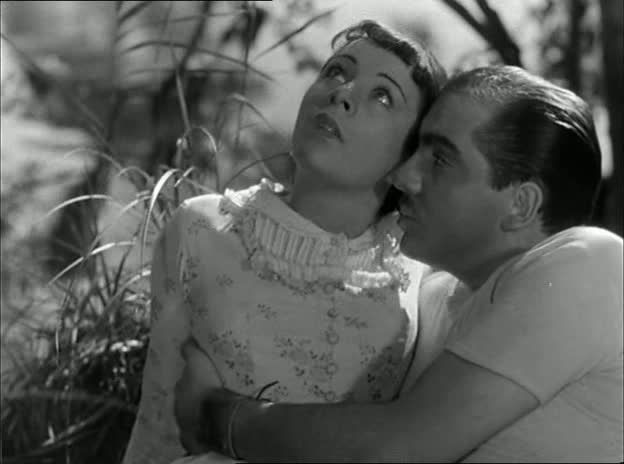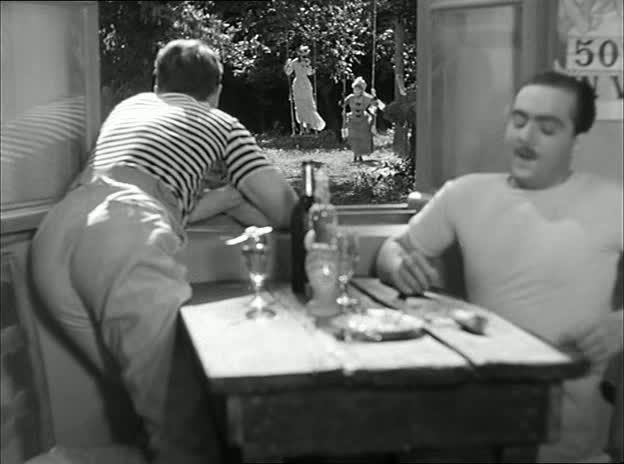
Jean Renoir apparently left Partie de campagne unfinished, but to watch the film as it exists, assembled into a 38-minute short from the footage he shot before abandoning the project, one would never guess. Based on a Guy de Maupassant story, it is a sumptuous, sensual, subtly moving film that extracts great and surprising pathos from a simple situation. The family of the bourgeois shopkeeper Dufour (André Gabriello) takes a weekend trip to the country for a picnic, a day of relaxation for the women and fishing for the men. Dufour brings along his wife (Jeanne Marken), his daughter Henriette (Syvlia Bataille), his old, deaf mother-in-law (Gabrielle Fontan), and Henriette's fiancé Anatole (Paul Temps). While there, a pair of local young men decide to seduce the women in the party, setting their sights on Sylvia and her mother, while the shopkeeper and Anatole remain oblivious, concerned only with a day of fishing.
It's a comic set-up, and Renoir plays it as such for much of the film. Anatole especially is a comic figure, an utter dunce who looks and acts like a dim-witted Stan Laurel to Dufour's blustery Oliver Hardy. Dufour is constantly lambasting his future son-in-law for his stupidity, and the young man simply cringes and whimpers and accepts the verbal beatings. He's obviously a poor match for the pretty, dignified Henriette, who's sensitive and sweet and loves the sensual pleasures of the countryside. Renoir, for his part, is clearly aligned with Henriette's wide-eyed appreciation of the world around her. Renoir's filmmaking is dazzling and intoxicating, wrapping the viewer in the sunny, warm atmosphere of a country day. As the party arrives at a small country inn and begins setting up for their picnic, Renoir cuts away from the bourgeoisie to the country folk, the innkeeper and his employees and friends, as they prepare to serve the guests. The young boatmen Henri (Georges d'Arnoux) and Rodolphe (Jacques Brunius) sit inside, eating and talking, with the more outgoing and sexually voracious Rodolphe trying to convince his friend that they should pursue a dalliance with the women among the new arrivals.
His chatter is unconvincing to Henri, who insists that his philandering days are behind him, but Rodolphe's point is made more emphatically when he throws open the window behind the two men, framing the idyllic scene outside as though it were a painting hanging on the wall. The two men in the foreground go out of focus as Renoir brilliantly frames the scene outside, a brightly lit rectangle of pure summer joy centered as a smaller frame within the film frame. Henriette and her mother swing back and forth outside, the sunlight filtering through the trees and dappling the ground with alternating spots of shadow and light. The exterior landscape is crisp and clear and invigorating in comparison to the gray fuzziness inside the inn; it's an invitation to languish in the sensual pleasures afforded by nature. Renoir's closeups of Henriette as she rides the swing are especially ravishing, as the girl smiles and laughs, her face rushing up towards the camera and towards the sky, towards the sun that beats down on her, bathing her in light.


The film meanders along in this way, lingering on scenes of beauty and peacefulness as the two young men begin their seduction against the backdrop of this natural splendor. The film is often light and funny, as the flirty, vivacious Madame Dufour instantly takes to her obvious counterpart, the predatory ladies' man Rodolphe, despite the latter's desire for the younger girl. Henriette is instead paired up with the sensitive, quiet, romantic Henri, and during a beautifully filmed boat trip, these two romances wind towards their inevitable conclusions. Henriette is especially attuned to nature, delighting in the details of life and vitality that she finds everywhere in the country. She admires a caterpillar and wonders at the richness of the tiny lives that scurry everywhere through the grass beneath her feet. Do these bugs also feel joy and sadness as people do, she wonders aloud; it is obvious that she is a girl who feels deeply and intensely, and it's hard to see what the oafish, oblivious Anatole, who virtually ignores her and wants only to go fishing, can have to offer her.
That's why, despite the film's rich humor and sensuous beauty, there's a strong undercurrent of sadness and despair running beneath its surface. Henri and Henriette spend a wonderful day on the river, as he rows her upstream towards a secluded spot where they sit together, listening to a nightingale's song, and inevitably wind up kissing amidst the reeds and tall grass. The sequence ends with a rainstorm that seems to portend the return of sadness after this brief respite of pleasure and holiday atmosphere. The wind begins to blow, shaking the trees and the reeds by the water, and the surface of the river ripples to life with tiny droplets of rain bouncing off the water, creating thousands of tiny pinprick splashes. Renoir's camera floats across the surface of the water, pulling back as though leaving this country idyll behind. This day of sunlight and celebration is over, the clouds have drifted in and the rain is falling. A title card announces that several years then pass, and that in the meantime Henriette has married Anatole.
It's possible that this sudden leap forward indicates the part of the film left unfinished, but if so the omission is only to the benefit of the film's effect. The passing over of several years of undoubted boredom and marital complacency suggests just how much was washed away by that storm, and just how fleeting the pleasure of that riverside dalliance was. After the text fills in the intervening years, Renoir returns without pause to the country river where the earlier picnic had taken place, as though no time at all had passed. The place is as beautiful as ever, and Henri still drifts along the river on his boat, but his reunion with Henriette after these missing years has a very different tone, poignant and regretful, infused with longing for what once was and might have been. It's a moving, mournful ending, cut with an undercurrent of dark humor as Henri watches his onetime lover row away, Henriette at the oars while her useless husband languishes in the boat's prow. It's the opposite of the way in which Henri once rowed her to this secluded spot to seduce her, and as he watches her row away, partially obscured by the leafy foliage overhanging the river, this last little comic touch becomes almost unbearably sad. What a wonderful, rich, warm, intelligent movie!









0Awesome Comments!